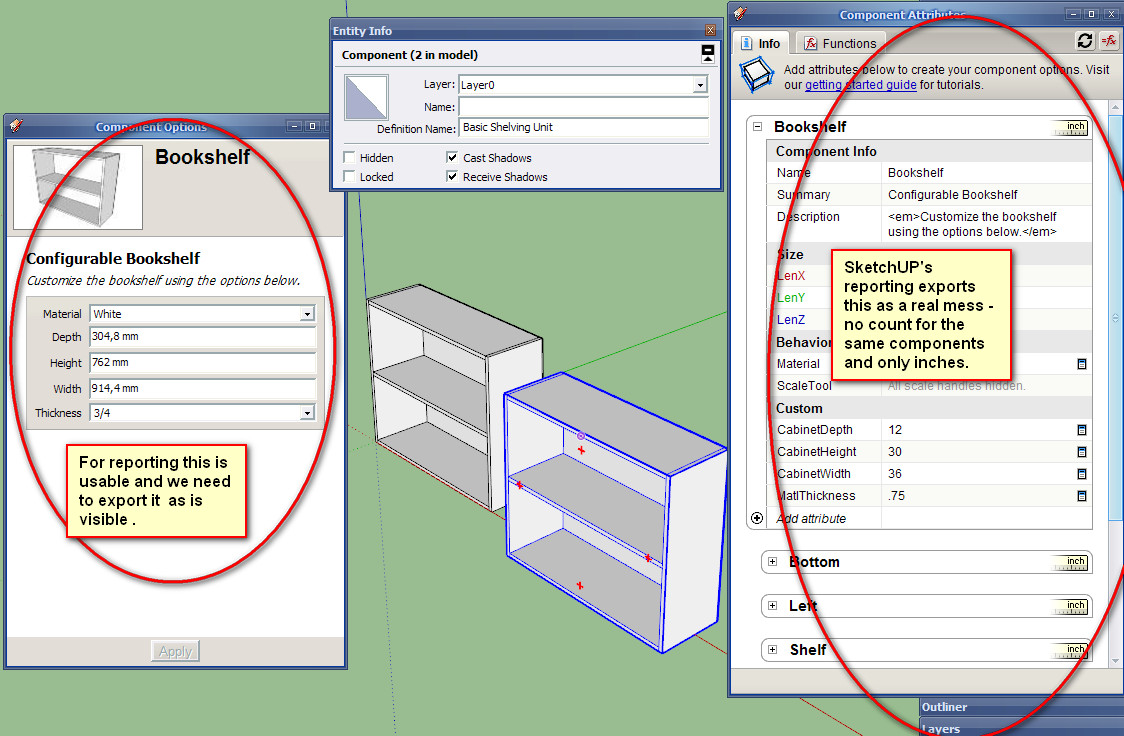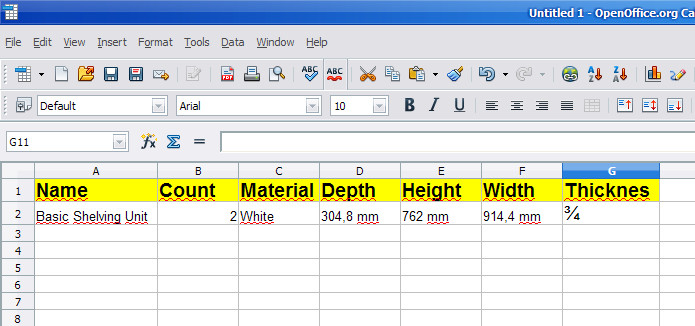Export For CAM software
-
I know this, but the question remains.
-
@dedmin said:
I'm not very familiar with the CAM technology, but could the way SketchUP handles the geometry be a problem? That everything is just a bunch of lines, instead of real curves?
Sketchup is a mesh modelling software. you can find more info about mesh modelling here: http://en.wikipedia.org/wiki/Polygon_mesh.
Smooth curves can be achieved by increasing the number of segments.
With a CNC flatbed router we currently export faces as DXF polylines with [url=http://www.guitar-list.com/download-software/convert-sketchup-skp-files-dxf-or-stl:lzs2i8uh]skp_to_dxf plugin[/url:lzs2i8uh] and then import these dxf files in the CAM software for tooling and G code generation. -
I will not give-up!
SU's dynamic components architecture is so powerful that it would be a shame if it cannot be used for manufacturing.
My wish is to find a script that would let you select a face in each components as primary face to be sent to the CNC.

Then,


Then all parts should be exported as individual dxf polylines in a specified folder ready for import in a CAM/nesting package.
-
Fully agree with You!! I wonder why nobody did this already - there are so many fellow woodworkers ready to pay for this!! But when You export a 5mm circle from SketchUP as .dxf it is not a circle anymore - that is why I asked above if this is a problem with CAM?
-
And there is need for a hole drilling plugin like this one - http://www.smartmachining.com/
-
I think holes will work better if a component is used, that way center point is easy to determine, and overall number of entities is reduced. Thinking there would be a component for 5mm system holes, 8mm construction holes, etc, and an attribute for export DXF layer. For routing paths, I think a DXF Export Layer attribute should handle tool diameter, depth of cut, any cutter compensation, and lead in/outs, depending on the CAM post. So the plan is to create a script that writes a DXF for each face thats defined for machining and create any routing and/or drilling on that face.
-
@dedmin said:
Fully agree with You!! I wonder why nobody did this already - there are so many fellow woodworkers ready to pay for this!! But when You export a 5mm circle from SketchUP as .dxf it is not a circle anymore - that is why I asked above if this is a problem with CAM?
It is not a problem. If you place the holes in a layer called a certain way ex: "DV_5" you can then set your CAM software to automatically use a 5mm bit to drill to the centre of any geometry placed in the layer "DV_5". no matter what shape the geometry is.
For curved free form shapes, increasing the number of segments will produce an acceptable result. -
That is good news - I was wondering for a long time can this be a problem!
-
Note that you can extract a DC's 'attributes' and use them in your 'reports'... there are several threads about this already...

-
Still, there isn't a clear solution for exporting DC options.
-
Since an 'option' is itself an attribute can't you use that to 'filter' the other attributes as needed ?
http://code.google.com/apis/sketchup/docs/tutorial_attrreporting.html -
Maybe I could give You an answer if I know anything about Ruby programing
 Downloaded the book "Automatic SketchUP" and I'm even more confused!
Downloaded the book "Automatic SketchUP" and I'm even more confused! 

-
Can we recap on the issues under discussion here...
Someone wants a tool that lets you export a selected DC as a 2D DXF - you pick the face to be 'up'.
So the tool needs to find the picked face in the DC and then make a 2D DXF from it ?
Perhaps the DC options are only needed for other reporting and not the DXF making ??
The DXF is made a report is made referencing the DXF and containing certain info extracted from the DC ?Please could the 'requester' post a step-sheet with images, results etc on how this is currently done 'manually' so that the automation is then clearer... I must be readily doable ?

-
I can comment only on exporting DC options, not attributes! Here we put all the valuable information that is visible and usable in SketchUp and in SketchUp Pro. We can make different components and put the info we need - for legs, doors, panels, handles and etc. that have the same options - we can select all the legs and change their options at once - for instance color or price. Then we need to export all this for reporting - the best as cvs so we can import in Excel or Calc and combine all the elements to get this


-
The the options are the attributes. You need a [new] attribute reader customized to your needs...

-
Does SketchUP holds all the attributes and the options in the same dictionaries? If so then the reader needs to export only the options of the selected components from that table.
-
The instance should hold various attributes values, the dictionary can be named whatever the creator called it - e.g. 'product_info'.
The DC's options/attributes are found in a special 'dynamic_attributes' dictionary.
The code at the end of the link I posted is specifically made to show you how to extract such info from a model / instance etc... -
The geometries should also be exported as follow:
- Create a dynamic component with attributes to be exported in the csv file.

- Select primary face in all components to be machined. (components such as hardware are excluded if no face is selected). Only one face per component can be selected.

- Tooling is set by placing geometries in specific layers. For example vertical drilling with a 5mm bit would be associated with the dxf layer called “DV_5”; Routing offset for external shape with DXF layer “ROX_9” (9 for a 9mm router bit.) any combination of machining can be accomplished by linking tooling “strategies” in the CAM software with DXF layers created by Sketchup.

- When the model is ready all “primary” faces are exported as DXF polylines in a specified folder together with the csv file.

- The csv file is then used to automate the import in the CAM software (Enroute, Aspan etc...)

-
I use a script to export the Entity Information, Attributes, and Outline (BOM Structure) from the SUP drawing into CSV files. But the CSVs are not "flat files", they use the EntityID to link records between each file after they have been imported into a database. I have attached samples of the files, perhaps the Data functions inside OpenOffice can help "flatten" the attribute information? or they could be imported into an OpenOffice Base ".odb" database, then you could write queries? Not sure if OpenOffice can link to the .csv files like MS Access does, and then you wouldn't have to re-import each time? Anyways, the script is very BETA at this point.
-
not sure if this will be of much help. I have used sketchup for CNC work and some of the plugins such as stl or dxf converters are good such as the one here
[url]
http://www.guitar-list.com/.../convert-sketchup-skp-files-dxf-or-stl
[/url]
but i also use mesh lab software. I only use this for smallish models and prototypes so I am not sure how well it will work for you but try itexporting from sketchup as a collada file and them messing about with it in meshlab, it does seem to work but needs experimenting with depending on what you are doing
Advertisement







